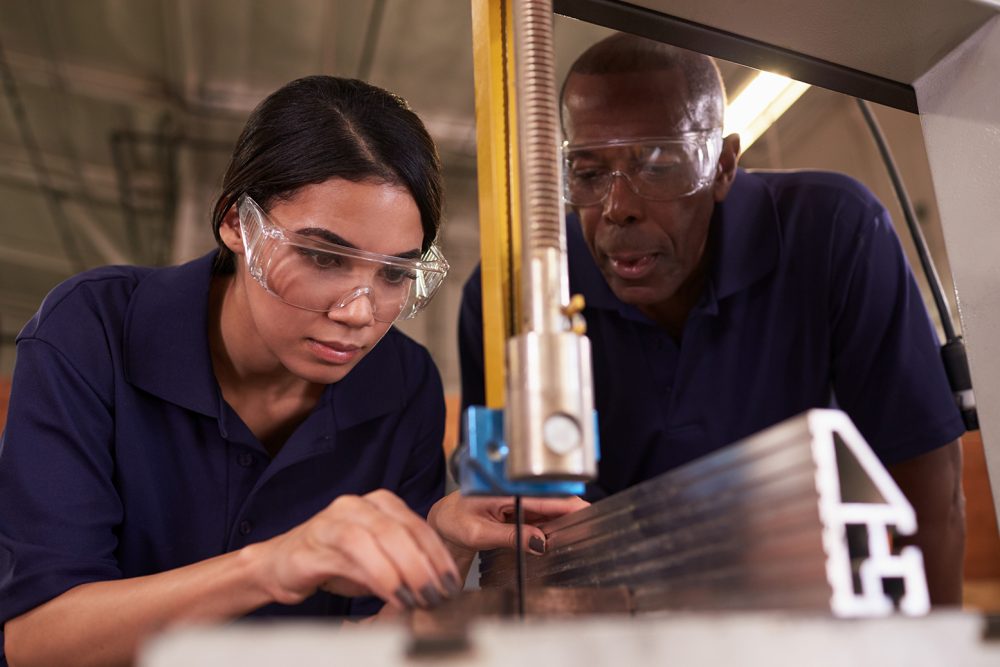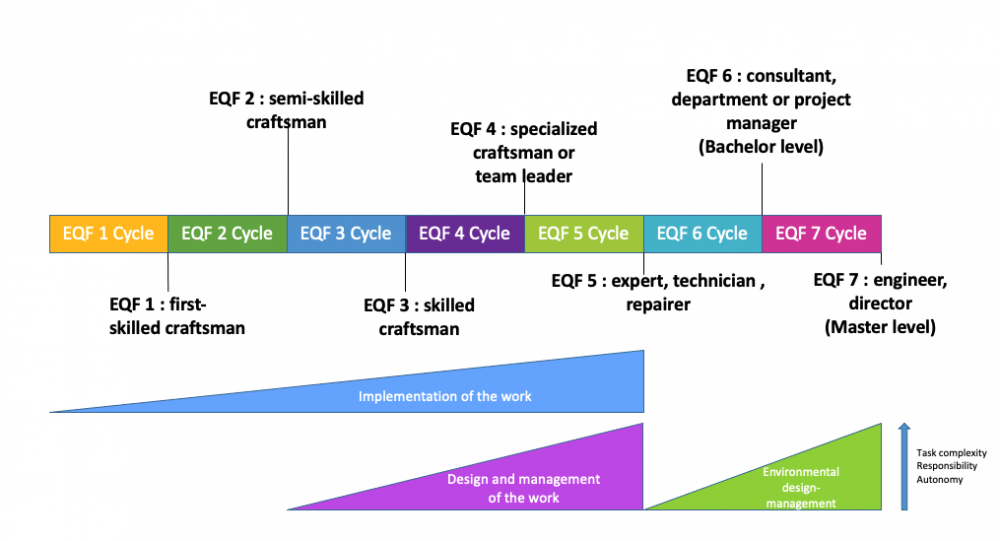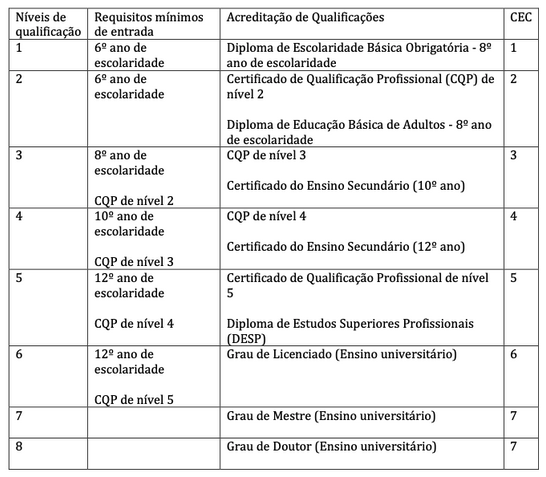Professional qualification levels in Cabo Verde
The European Qualifications Framework was adapted to the levels of Cabo Verde National Qualifications System in the field of continuous vocational training.


Pedagogical engineering
The skills repositories/ activities of the Luxembourg GTB and PAR Competence Centers were harmonized according to the European Qualifications Framework (EQF). This same system was transferred and harmonized to Cabo Verde’s National Qualifications System.
A professional skills repositories system can include up to 7 EQF levels: EQF 1, EQF 2. EQF 3, EQF 4, EQF 5, EQF 6, and EQF 7 reflecting competencies development based on the following criteria;
– Complexity of tasks and situations
– Autonomy of action
– Responsibility for the tasks and activities performed
– Implementation or design functions
The table of EQF levels below shows the correspondences between the EQF level, the professional qualification title and the corresponding diploma levels.
THE LEVELS OF THE EUROPEAN FRAMEWORK QUALIFICATIONS IN THE PROFESSIONAL DOMAIN




QEQ 1: UNQUALIFIED TECHNICIAN
QEQ 1: UNQUALIFIED TECHNICIAN
When applying to the profession or training QEQ 1, the future technician is a beginner. He has basic general knowledge, but lacks skills (knowledge and experience) in the area.
Without qualification, the QEQ 1 technician is an artisan: he works with his hands and performs simple, routine tasks under the direct supervision of a qualified technician, in a structured framework. He also prepares materials, tools and machines. He supplies and cleans the workplace and transports the material.
The worker can also drive and use small construction machines. He has knowledge of environmental, safety and health regulations. He is in contact with other similar professional groups in the workplace.
The end of the training cycle with the completion and validation of an exam gives the professional level of EQF 1.
The duration of the training cycle can vary between 100 and 150 hours of training depending on the profession.
Validation of professional knowledge allows recognition of a QEQ 1 level and the status of unqualified technicians.
EQF 2: SEMI QUALIFIED TECHNICIAn
The EQF level 2 technician is in the qualification process. He has acquired the fundamental bases of the profession and has the professional know-how related with carrying out simple tasks.
He is guided by a qualified technician (EQF level 3) in carrying out daily professional activities under intermittent supervision. He is able to read plans, draw simple schematics, participate in workplace stock management, use manual or stationary machines. He is responsible for respecting environmental, safety and health regulations.
The QEQ level 2 technician assists the qualified technician in performing more complex tasks and in activities related to energy efficiency (insulation and waterproofing).
The assistant technician must, therefore, be able to use the resources at their disposal, take the initiative, propose solutions to face the daily problems he will encounter in the exercise of his profession.
The end of the training cycle with the completion and validation of an exam gives the professional level 2 of EQF.
The duration of the training cycle varies between 200 and 300 hours of training depending on the profession.
The validation of professional knowledge allows the recognition of a EQF level 2 and the status of a semi qualified technician.
See below the skills assessment chart of Mário, roof structure carpenter.


After the validation of professional skills, Mario has a EQF level 2 and is in the cycle EQF level 3. He may decide to attend training to develop his skills in activities n. 1 and 3. Thus, in case of success in the training exams, he can be recognized with an EQF level 3. Mario may also decide to enter the training to develop his skills and reach the EQF level 4 in activity n. 2. He will therefore become an expert in activity n.2, even if his overall level remains at EQF level 2.
QEQ 3: QUALIFIED TECHNICIAn
The EQF level 3 technician guarantees the independent performance of complex technical activities and activities related to energy efficiency and sustainable construction. In addition to technical services, the qualified artisan is also responsible for the smooth running of the work, respecting the requirements of environmental, quality, health and safety standards. He constitutes and manages the stock (choice of materials and analysis of needs, management of orders and on-site deliveries), and may have qualifications to drive construction machines.
He supervises all the work carried out by EQF level 1 and EQF level 2 technicians.
He manages the set of activities in the workshop or on-site through a professional methodology and the execution of the work stages: knowledge of the project and objectives, design and reading of plans, preparation of materials and implementation of structures, carrying out a work, management internal and external personnel (customers, other professionals), communication with the engineers’ office and team leader, evaluation of the works and reception of the works.
The end of the training cycle with the completion and validation of an exam gives you the professional level of EQF 3.
The duration of the training cycle varies between 300 and 450 hours of training depending on the profession.
The validation of professional knowledge allows the recognition of an EQF level 3, and the status of qualified technicians.
EQF 4: team leader or specialized craftsman
There are two statutes for EQF level 4: Team Leader or Specialist Technician. The skills and training cycles are not the same.
1. Team leader
The team leader is responsible for operationalizing the work objectives. He participates in the design of the works, and ensures the organization, execution, management and evaluation of the work in the workshop or on-site, and the direct supervision of a small team. It ensures and takes the necessary measures to ensure that the work carried out complies with the established objectives and with the environmental, safety, health and quality requirements. He takes into account the work of other professionals involved to ensure a coherent dynamic of the activities carried out. It ensures the interconnection between the design team and the production team.
In addition to technical supervision of the work, he also performs certain activities.
The team leader’s training course is based on the professional skills listed in the skills repository. Along this course, the reinforcement of competences will focus mainly on the areas of management, communication, project methodologies and management.
The end of the training cycle with the completion and validation of an exam gives the professional EQF level 4 with the mention of ‘team leader’.
The duration of the training cycle is about 160 hours of training.
2. Specialized technician
Specialized technician has developed skills in a specific domain and is able to carry out the delicate and complex activities related to that domain (examples: an underwater welder or a heat insulator that manufactures pipeline coatings).
The specialized technician’s training course is based on the professional skills listed in the skills repository. Along this course, the strengthening of competence will focus mainly on technical and complementary areas, or those linked to energy efficiency.
The end of the training cycle with the completion and validation of an exam gives you the professional EQF level 4 with the mention of ‘specialized technician’.
The duration of the training cycle varies between 140 and 200 hours of training.
The validation of professional competences allows the recognition of a EQF level 4 and the status of specialized technician or team leader.
EQF 5: Higher Technician or someone with a professional certificatioN
The EQF level 5 technician has developed specialized knowledge in a particular domain. He holds a professional certificate, a higher technical degree or equivalent. He is more involved in design and evaluation activities than in operational activities.
The training course is based on the skills registered in different skills repository related to the profession.
The end of the training cycle with the completion and validation of an exam gives the professional an EQF level 5 in a certain technical area.
The duration of the training cycle varies between 300 and 450 hours of training according to the professions or professional sectors.
The validation of professional competences allows the recognition of an EQF level 5 in one of the technical areas.
EQF 6: Consultant, department manager or project manager
The consultant or department or project manager with EQF level 6 has developed monitoring skills and strategic change management for the development and proper functioning of the department company, or project. He holds a bachelor’s degree and has technical skills in the professional sector he operates. It is more involved in the design and evaluation phases of the work than in the operational execution.
The training course is based on the skills registered in different skills repository related to the profession.
The end of the training cycle with the completion and validation of an exam gives the professional an EQF level 6 in a certain technical area.
The duration of the training cycle varies between 300 and 450 hours of training according to the professions or professional sectors.
The validation of professional competences allows the recognition of an EQF level 6 in one of the technical areas.
EQF 7: Engineer, Director of Services
The engineer or director of services at EQF level 7 has developed competences in the design, strategic orientation, management and evaluation of large-scale technical and human devices. He holds a master’s training degree and has technical skills in the professional sector or in Human Resources. He is more involved in the design and evaluation phases of the work than in the operational execution.
The training course is based on the skills inscribed in the different skills repositories related to the profession.
The end of the training cycle with the completion and validation of an exam gives the professional EQF level 7 in a certain technical area.
The duration of the training cycle varies between 300 and 450 hours of training according to the professions or professional sectors.
The validation of professional competences allows the recognition of a level 7 EQF in one of the technical areas.
If you need support in the design of professional benchmarks, initial training for students and apprentices, or tailor-made training for your employees, do not hesitate to contact us!

